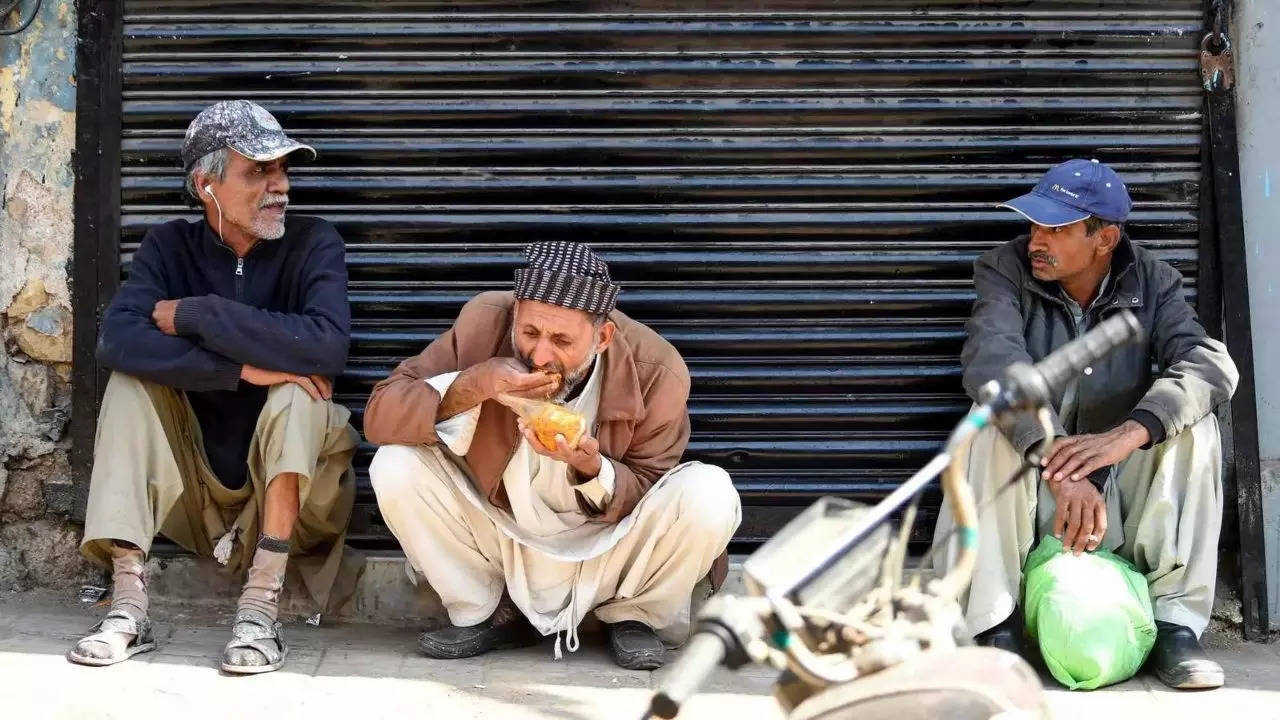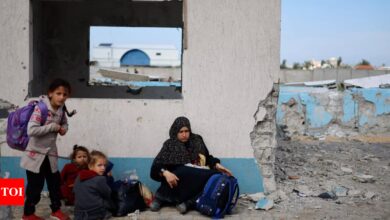World
Pakistan inflation rises to 48-year high as IMF visits

[ad_1]
KARACHI: Inflation has risen to a 48-year high in crisis-hit Pakistan, where the International Monetary Fund is visiting for urgent talks, according to data released on Wednesday by the country’s statistics bureau.
Year-on-year inflation in January 2023 was recorded at 27.55 percent, the highest since May 1975, with thousands of containers of imports held up at Karachi port.
Pakistan’s economy is in dire straits, stricken by a balance of payments crisis while it attempts to service high amounts of external debt.
The world’s fifth-biggest population has less than $3.7 billion in the state bank — enough to cover just three weeks of imports.
On Tuesday, an IMF delegation arrived in Islamabad to revive negotiations over a stalled bailout package with the government, which has so far held out from meeting the global lender’s tough conditions.
But in recent days, with the prospect of national bankruptcy looming and no friendly countries willing to offer less painful bailouts, Islamabad has started to bow to pressure.
The government loosened controls on the rupee to rein in a rampant black market in US dollars, a step that caused the currency to plunge to a record low. Artificially cheap petrol prices have also been hiked.
The state bank is no longer issuing letters of credit, except for essential food and medicines, causing a backlog of thousands of shipping containers at Karachi port stuffed with stock the country can no longer afford.
‘One cannot earn enough’
Industry has been hammered by the imports block and massive rupee devaluation. Public construction projects have halted, textiles factories have partially shut down and domestic investment has slowed.
The National Consumer Price Index for January 2023 rose by 2.88 percent from the previous month, the figures released on Wednesday showed.
In downtown Karachi on Monday, dozens of day labourers including carpenters and painters waited with their tools on display for work that never comes.
“The number of beggars has increased and the number of labourers has decreased,” said 55-year-old mason Zafar Iqbal, who was eating biryani from a plastic bag donated by a passerby.
“Inflation is so high that one cannot earn enough.”
Former Prime Minister Imran Khan, who was ousted last year in a no-confidence motion, negotiated a multi-billion-dollar loan package from the IMF in 2019.
But he reneged on promises to cut subsidies and market interventions that had cushioned the cost-of-living crisis, causing the programme to stall.
It is a common pattern in Pakistan, where most people live in rural poverty, with more than two dozen IMF deals brokered and then broken over the decades.
Year-on-year inflation in January 2023 was recorded at 27.55 percent, the highest since May 1975, with thousands of containers of imports held up at Karachi port.
Pakistan’s economy is in dire straits, stricken by a balance of payments crisis while it attempts to service high amounts of external debt.
The world’s fifth-biggest population has less than $3.7 billion in the state bank — enough to cover just three weeks of imports.
On Tuesday, an IMF delegation arrived in Islamabad to revive negotiations over a stalled bailout package with the government, which has so far held out from meeting the global lender’s tough conditions.
But in recent days, with the prospect of national bankruptcy looming and no friendly countries willing to offer less painful bailouts, Islamabad has started to bow to pressure.
The government loosened controls on the rupee to rein in a rampant black market in US dollars, a step that caused the currency to plunge to a record low. Artificially cheap petrol prices have also been hiked.
The state bank is no longer issuing letters of credit, except for essential food and medicines, causing a backlog of thousands of shipping containers at Karachi port stuffed with stock the country can no longer afford.
‘One cannot earn enough’
Industry has been hammered by the imports block and massive rupee devaluation. Public construction projects have halted, textiles factories have partially shut down and domestic investment has slowed.
The National Consumer Price Index for January 2023 rose by 2.88 percent from the previous month, the figures released on Wednesday showed.
In downtown Karachi on Monday, dozens of day labourers including carpenters and painters waited with their tools on display for work that never comes.
“The number of beggars has increased and the number of labourers has decreased,” said 55-year-old mason Zafar Iqbal, who was eating biryani from a plastic bag donated by a passerby.
“Inflation is so high that one cannot earn enough.”
Former Prime Minister Imran Khan, who was ousted last year in a no-confidence motion, negotiated a multi-billion-dollar loan package from the IMF in 2019.
But he reneged on promises to cut subsidies and market interventions that had cushioned the cost-of-living crisis, causing the programme to stall.
It is a common pattern in Pakistan, where most people live in rural poverty, with more than two dozen IMF deals brokered and then broken over the decades.
#Pakistan #inflation #rises #48year #high #IMF #visits






